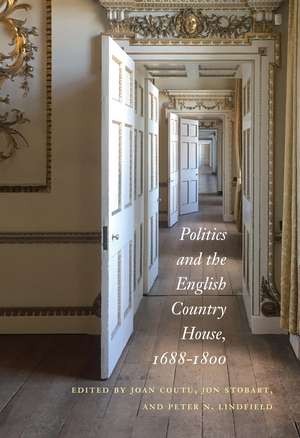Politics and the English Country House, 1688–1800
Editat de Joan Coutu, Jon Stobart, Peter N. Lindfielden Limba Engleză Hardback – 14 feb 2023
Politics has always been at the heart of the English country house, in its design and construction, as well as in the activities and experiences of those who lived in and visited these places. As Britain moved from an agrarian to an imperial economy over the course of the eighteenth century, the home mirrored the social change experienced in the public sphere. This collection focuses on the relationship between the country house and the mutable nature of British politics in the eighteenth century. Essays explore the country house as a stage for politicking, a vehicle for political advancement, a symbol of party allegiance or political values, and a setting for appropriate lifestyles. Initially the exclusive purview of the landed aristocracy, politics increasingly came to be played out in the open, augmented by the emergence of career politicians – usually untitled members of the patriciate – and men of new money, much of it created on Caribbean plantations or in the employ of the East India Company. Politics and the English Country House, 1688–1800 reveals how, during this period of profound change, the country house remained a constant. The country house was the definitive tangible manifestation of social standing and, for the political class, owning one became almost an imperative. In its consideration of the country house as lived and spatial experience, as an aesthetic and symbolic object, and as an economic engine, this book offers a new perspective on the complexity of political meaning embedded in the eighteenth-century country house – and on ourselves as active recipients and interpreters of its various narratives, more than two centuries later.
Preț: 532.23 lei
Preț vechi: 657.08 lei
-19% Nou
Puncte Express: 798
Preț estimativ în valută:
101.85€ • 110.60$ • 85.56£
101.85€ • 110.60$ • 85.56£
Carte disponibilă
Livrare economică 01-15 aprilie
Livrare express 15-21 martie pentru 55.43 lei
Preluare comenzi: 021 569.72.76
Specificații
ISBN-13: 9780228014027
ISBN-10: 0228014026
Pagini: 344
Ilustrații: 91 photos
Dimensiuni: 165 x 241 x 30 mm
Greutate: 1.16 kg
Editura: McGill-Queen's University Press
Colecția McGill-Queen's University Press
ISBN-10: 0228014026
Pagini: 344
Ilustrații: 91 photos
Dimensiuni: 165 x 241 x 30 mm
Greutate: 1.16 kg
Editura: McGill-Queen's University Press
Colecția McGill-Queen's University Press
Recenzii
“A fascinating, important, and well-crafted volume that explores architecture and collections, and their intersections with ideas, society, and varying levels of politics in new ways.” Stephen Hague, author of The Gentleman’s House in the British Atlantic World, 1680–1780
Notă biografică
Joan Coutu is professor of art history and visual culture at the University of Waterloo and the author of Then and Now: Collecting and Classicism in Eighteenth-Century England. Jon Stobart is professor of social history at Manchester Metropolitan University.Peter Lindfield is lecturer in history at Manchester Metropolitan University.
Descriere
Politics has always been at the heart of the English country house, in its design and construction, as well as in the activities and experiences of those who lived in and visited these places. As Britain moved from an agrarian to an imperial economy over the course of the eighteenth century, the home mirrored the social change experienced in the public sphere. This collection focuses on the relationship between the country house and the mutable nature of British politics in the eighteenth century. Essays explore the country house as a stage for politicking, a vehicle for political advancement, a symbol of party allegiance or political values, and a setting for appropriate lifestyles. Initially the exclusive purview of the landed aristocracy, politics increasingly came to be played out in the open, augmented by the emergence of career politicians – usually untitled members of the patriciate – and men of new money, much of it created on Caribbean plantations or in the employ of the East India Company. Politics and the English Country House, 1688–1800 reveals how, during this period of profound change, the country house remained a constant. The country house was the definitive tangible manifestation of social standing and, for the political class, owning one became almost an imperative. In its consideration of the country house as lived and spatial experience, as an aesthetic and symbolic object, and as an economic engine, this book offers a new perspective on the complexity of political meaning embedded in the eighteenth-century country house – and on ourselves as active recipients and interpreters of its various narratives, more than two centuries later.
